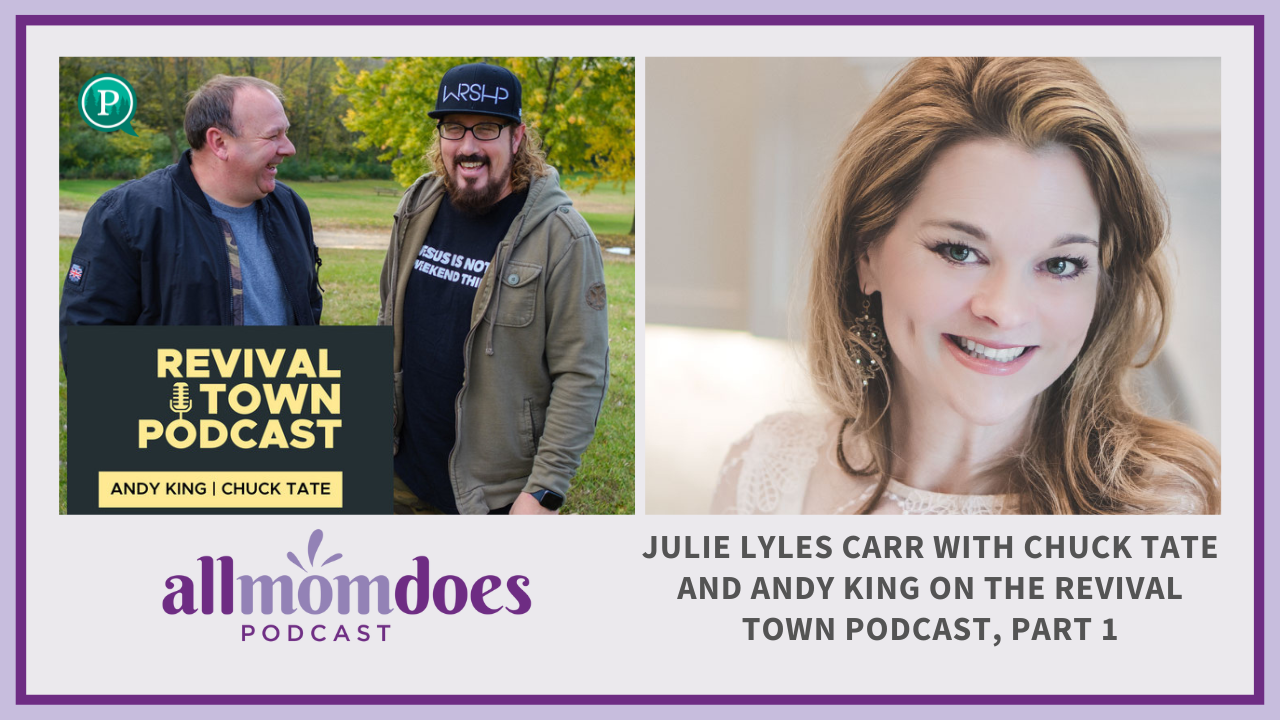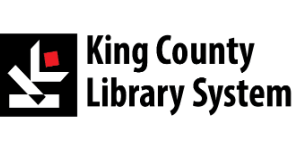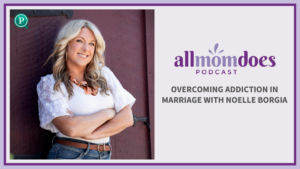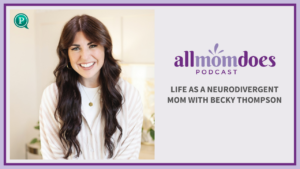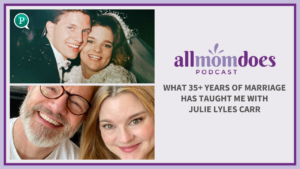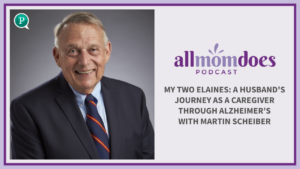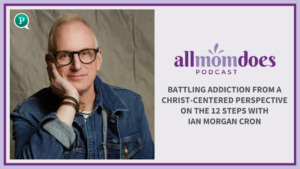Today we switch it up and Julie is the guest! Andy King and Chuck Tate of the popular Revival Town Podcast welcomed Julie as a guest and their conversation on raising kids, the growing conversation about women carrying a heavy percentage of the mental load for a family, embracing our families as a collection of individuals, it’s a chat you don’t want to miss!
Special thanks to the King County Library System for sponsoring the AllMomDoes Podcast!
Show Notes:
Revival Town: Online | Instagram | Facebook | Twitter
Find Julie: Online | Instagram | Facebook | Twitter | Pinterest
AllMomDoes | Instagram | Facebook | Twitter
Transcription:
Purposely. Your life, God’s purpose. Listen at onpurposely.com.
Julie Lyles Carr:
Today we’re doing something a little unusual on the AllMomDoes Podcast. We are turning the mic around and today I’m going to be the guest. I have two great friends in the podcasting world, Andy King and Chuck Tate. They have a podcast called the Revival Town Podcast and they’ve been so gracious to have me on. And this is a conversation that we had a little while back. We’re going to talk about a lot of different things, including what it means to let our kids be the individuals that God intends them to be, how to get out of the way of that, what the landscape for women is today for moms, because there are so many things that we’re trying to hold down, so many things that we’re trying to do and what that means in our family lives.
This is a great conversation that delves into all kinds of things so close to our heart, from parenting to marriage to our lives as moms, as women. So I’m so excited to introduce you to my amazing friends, Chuck Tate and Andy King, as we do a rebroadcast from their show today, from the Revival Town Podcast. I’m Julie Lyles Carr, and you are listening to a collaborative episode on the AllMomDoes Podcast.
Chuck Tate:
Julie, welcome to Revival Town Podcast.
Julie Lyles Carr:
I am so glad to be with you guys today. Thanks so much for having me.
Chuck Tate:
Yes, and I know as busy as you are, we consider it an honor that you would take a little bit of time to encourage us and speak to our listeners today.
Julie Lyles Carr:
Well, it’s my joy. Thanks so much.
Chuck Tate:
Yes, well, let’s just get right to it. You have done a lot. You do a lot, the things that we just mentioned. The first question I have, and we want to hear a little bit of your story. But before that, how do you balance everything that you accomplish while being a mother, while being a wife, a mom to eight kids?
Julie Lyles Carr:
I have this idea now, maybe I’m not right, but I have this idea that balance is a myth. And I think there are times that I’ve allowed things to get far more out of balance. I think that perhaps what we’re really trying to achieve maybe is to come as close as we can to a fulcrum that makes sense. But I do think there are times that God calls us into a season that’s really busy and really crazy and I think he can call us into seasons that have more rest. I think where I’ve struggled is identifying the seasons where I need rest without just having to get myself flattened. Just something that comes along and I’m like, “Oh, I think I’ve been pushing a little too hard.” But I do think there is sometimes a weird pressure that we can put on ourselves when we know that things are really crazy busy or we know that things are kind of quiet and we feel like there’s some other destination out there that’s supposed to feel a bit more balanced.
Like, maybe we get the bubbles on the level a little more close to the center, but I’ve come to just embrace a little bit that it’s just not like that. I mean, when you first bring a baby home, I can speak to that metaphor. When you first bring a baby home from the hospital, you’re going to have a season where the sleep is going to be absent and the fatigue is going to be heightened and all the things, and then you’re going to move into a season as they get a little older where those things come a little more into balance. But there are other things. So for example, having to go through multiplication tables over and over and over, that don’t feel in balance at all. So I think I’ve just learned to embrace those seasons, to run real hard when I’ve got a season in front of me where there are things going and moving and all the things. And then learning, and I’m still learning this, to rest and rest well when it’s a quieter season.
Chuck Tate:
And you believe in naps?
Julie Lyles Carr:
Oh, my mom, I was actually just working on an article for this. My mom says that from birth, I was one of those who did not nap. It was horrifying to me. And I can remember as a little kid when it would be a nap time at preschool or something like that, just being outraged that I was being asked to do this. Didn’t they know the world was spinning? We were burning daylight, what was going on? There was so much to do, so many things to see. Now, Chuck, honestly, I am like a two-year old at lunch rubbing my eyes going, “Will somebody just please put me down for a nap?” I am a big believer in naps, but part of that is I went off caffeine about three years ago and when you remove caffeine from your life, you discover that you might need to sleep a little more, but you’re not going to be as anxious. So there’s a benefit.
Chuck Tate:
That’s good. Wow, good stuff. Well, Andy, I met Julie back in 2015 at a conference called Rewrite Conference. Of course, we had Esther Fedorkevich a few weeks ago on the podcast, and Julie, I was impressed with you as an MC. Of course, you MCed the whole event, the conference and weekend, and got to know you a little bit and then had you on my podcast 41 Strong to talk about Raising An Original. And since then, you’ve done so much, you’ve written more books, you’ve published a book with Jackie Velasquez and a number of things. So it’s just cool to have you here and kind of watch at a distance all that you’ve accomplished and all the things that God has done in you and through you. But can you bring us up to speed for those that are meeting you for the first time? Kind of tell us your story.
Julie Lyles Carr:
Absolutely. Well, I was born in Huntsville, Alabama. I didn’t know I had an unusual childhood. We moved all over the place, but the reason we were moving around so much is because my dad was a literal rocket scientist. He was with the space shuttle program. And so I was born at Marshall Space Center in Alabama and then we ended up near Philadelphia and then we went out to Los Angeles because we were close to Edwards Air Force base where the shuttle would land. Then we went to Washington DC because my dad was the governmental liaison there for the shuttle program. And then we went to Utah because of the Bonneville Salt Flats. You can go out on the Bonneville Salt Flats and light all kinds of things on fire and launch things and test things. And so I had no idea that every kid wasn’t being raised around these Mensa level giants.
I had no concept of that. And it was only really when I got into my twenties and looked back that I thought what an unusual, exceptional way to grow up. Because the thing that I’ve come to really embrace about rocket scientists in particular, but has been real handy in my work as a journalist and in media and as a writer, is that rocket scientists to me have this beautiful, audacious, functional creativity. And my dad was a rocket scientist, my mom was an accountant. They knew that I had this warrior poet heart and they were insistent that I would be a functional creative. So when I was in third and fourth grade, my dad would have my brothers and I fill out these index cards of our goals for the day and we would have to check in with him on how we did on those goals.
But when you think about somebody who worked in rocketry in those years and at that time, what a crazy idea. I mean, to take math and science and use it to launch people off the planet and for the beauty of exploring for the beauty of pioneering. So I look back now and I really embrace that experience and that childhood, very unusual. I met my husband Mike when we went to Abilene Christian University and I was in radio and television at the time, worked with CBS and we had a 10-year plan about waiting to start our family. It was a beautiful plan. And we should have laminated it because life splashed all over it and things radically changed, as it does when God gets hold of your heart and just rewrites your story in a different way. So we had been married 15 months when our first baby came along, Madison, and I really think Mike thought that was going to be it. Like, all right, one and done.
This happened a lot earlier than we anticipated, and we’ll be done. But as she got older, I said, “Well, what do you think about a sibling from Madison?” And so then along came McKenna. And then we really thought we were done, and then we weren’t done. So we went all the way up to eight kids. And that’s kind of an interesting story. My husband likes to say that spontaneity can cause people, but there was also…
Chuck Tate:
I love that.
Julie Lyles Carr:
Yeah, let that soak a minute. But there was also a lot of seeking God. This was not something we had been. We hadn’t been raised around mega sized families. It wasn’t something that we felt some kind of legalism toward that we had to do or anything like that. It was just continuing to lean into God and explore what that path might be. Part of our story is two of our kids are differently abled. One has a significant hearing loss and one had a stroke at birth. That journey’s been really beautiful and has led to some really powerful things that have happened along the way and communities that we became a part of and were able to reach out to and hopefully do some good in that maybe we wouldn’t have noticed as distinctly as before. And so that’s been a really powerful part of the story.
And all along the way, just like you, Chuck, I’ve been writing always, after that experience of putting to paper what I feel like God’s showing me in my heart, both in fiction and nonfiction. And have spent a lot of time on church staffs doing some different work in those areas, specifically working with women for the most part, but also speaking. And now we are the proud in-laws of a son-in-law and a daughter-in-law, and we’re getting a new son-in-law in a few weeks.
Chuck Tate:
Wow, congratulations.
Julie Lyles Carr:
So that’s a new chapter for us as kids are launching. Thanks. It’s been really interesting to be down to just four or five kids in the house and be able to take down some of the bunk beds which have been lined up in some of the different passage ways of the house. This past year, it was really exciting. My husband Mike won the Toastmasters International Competition, so I now am married to the world champion of public speaking.
Chuck Tate:
Wow, how cool is that?
Julie Lyles Carr:
Yeah, it’s been really fun.
Chuck Tate:
Can you go get him real quick so we can ask him some questions?
Julie Lyles Carr:
I can text him. We’ve been officing from home like a lot of people have been, and that has been a whole dance, which has been really interesting. At the beginning of the pandemic, my daughter who was about to get married, she was living here in Austin, her fiancé was in San Antonio, and they asked if they could come and shelter in place with us. So we moved two more people back in on top of the five who were already living here, within Mike and I officing from home. So at times we had five and six people working from home. And two of my kids are professional dancers, so they were teaching tap dancing as Mike and I were trying to do interviews and conference calls and you’d find yourself hiding in a random bedroom closet trying to come off as being really professional. It was quite the experience to turn, we call it Carr HQ, to turn Carr HQ also into the office complex.
Some of my very favorite summer memories are when I would go to the library during the summer as a kid and I would just sit myself down in front of an aisle and just pull book after book after book, doing all kinds of reading and dreaming and researching. And that is something I still carry with me to this day. There’s just something about getting into the library and taking some time to peruse the aisles, look at different things, let my mind go in different directions.
And guess what? That’s what we want you to do with the King County Library System. Because this summer there’s a summer reading program for all ages. You can earn prizes for reading, you can enjoy different programs and activities at the library all summer long. This free summer reading program is open to children, teens, and adults. And here’s the goal. Your goal is to read 20 minutes per day, or you can set your own reading goal if you want, through August 31st. Any kind of reading counts. So this includes reading to someone else out loud or listening to an audiobook or taking that little summer read to the pool while you play in the sunshine. So be sure and visit your community library to pick up a reading challenge log or go to kcls.org/summer. That’s kcls.org/summer to get started. So book it, see what I did there? To your King County Library System, and be sure and sign up for the summer reading program.
Andy King:
I was going to ask you, obviously Mother’s Day was this last week, and just thinking about mothers during COVID. And obviously for you, a lot of kids, people moving in, what were some of the significant things for you that perhaps your rhythms, your practices that you have to do at home, what were some of the things that were challenging for you and that you felt, “Man, we’ve got to change some things up a little bit”?
Julie Lyles Carr:
Andy, it’s interesting. I had already been officing from home quite a bit and we’ve homeschooled our kids, so we were already a little bit in the rhythm of work from home, school from home, and it was still wildly disruptive. So for anybody out there who’s listening who feels like this last year has just made you feel like you’ve been run over by a bus, even as someone who’s had long experience in a rhythm that is not all that altered from what we have all been walking through, it’s still different. It’s still different to have more people coming and working from home. My office, which has primarily been my office, all of a sudden Mike moved in. And even though Mike and I share a bedroom and a bathroom and a closet, his office habits are different than mine. And so learning to navigate, even in just trying to work in the same space with my spouse, is different.
The rhythm of Mike is an extrovert’s extrovert, and I am really more of an introvert, but everybody thinks I’m an extrovert, which people call an ambivert. So for Mike, the experience of all of a sudden being home all the time and him needing that social stimulation so much, even though we did have a whole buffet of people here all doing all kinds of things, that was still a big adjustment. Just even him following me around talking all the time, which I don’t mean in a critical way, I just mean I’m so accustomed to him having so many events he’s at and so many social events and on and on and on. So all of a sudden he’s here all the time. Those things were interesting.
I think the other thing that it exposed, and we see a lot of this showing up now when it comes to looking at the statistics and the trends over this past 12 months for women, is we see now that even in the ways that we have guys who are so supportive of us and who are encouraging us, and my husband certainly is that way, it really is exposing to realize how much women do carry even when they are holding down jobs outside of the home. And we’re seeing statistics that bear that out. And that was one of the rhythms that I noticed we got into. More people in a home means more mess, more stuff, just because everybody’s working here. And I did find that my mom duties seemed to be amping up as well, even with adult people coming in, even with people pitching in and pulling me away from other tasks and projects that I might have been focused on, had we not been in the middle of the pandemic.
So those kinds of things I think we’re going to be unpacking for a long time. And Chuck, I know in your pastoral life, I know in mine, I was already seeing a lot of phenomenon that we call the walkaway wife syndrome, which is pretty new that we’re seeing, which is women who get so up to here with trying to hold down the job and the kids and the household tasks and all the things that they’re doing. Something that’s pretty unprecedented, at least as long as we look at American culture and American motherhood, and that is they’re walking away from spouse and kids, like they’re just leaving. And this is happening in Homes of Faith as well. So I do think the pandemic has given us an opportunity and a spotlight to say, okay, where are we really at in our relationships and how we manage our homes? Because women are shouldering a lot, and that’s not a male bashing thing at all.
That’s just saying we’re in a new season, we’re in a new time in which our expectations of each of the partners in a marriage and each of the partners in parenting may have different expectations on them and different burdens and different responsibilities. Are we having the conversations that honor everybody, allow everybody room to thrive and to flourish, and how are we doing that? So I’ll be really curious on the other side of this to see what we’ve learned and how we apply it. Because these hoof beats, we’re already heading down the path. We could hear them, and I know pastorally, I’m sure you guys have seen it too. I was already seeing a lot of it. I think this will be an accelerant. So I’m going to be really curious to see how we handle this in our faith communities as things begin to open back up.
Chuck Tate:
Absolutely. Yeah, that’s really good stuff. Well, you mentioned expectations, and I know that there are parents, moms listening today, there are moms struggling. There are moms that have fallen into the comparison trap where they are scrolling Instagram and it appears that some of these other moms are super moms who have it all together. And sometimes we put new expectations, or I should say unrealistic expectations, on our own kids. In your book, Raising An Original, you said nobody has ever raised your kid before. In other words, you get to do this, mom, dad. Right? So can you unpack that a little bit? Because I love that.
Julie Lyles Carr:
I think one of the things that really struck me, those early days of parenting, I wanted to get it right, and I think we all want to get it right. Right is a very nebulous term. Right can carry a lot of societal weight. And what looked right 200 years ago and what looked right 100 years ago and what looked right 30 years ago is different than what looks right now. And I’m not talking about truth and morality, I’m talking about the places that we think a healthy kid should, fill in the blank. And for some moms and dads, that’s the ATC score, the SAT score. Sometimes it’s sports, sometimes it’s extracurricular, sometimes it’s that your kid is killing it in his STEM club after school or whatever the thing is. And we gather those things as proof that we’re doing it right. And we look externally at how other people are doing it and families we admire and kids we see who we think, “Oh, thank goodness their mom and dad got it so their future is buttoned up. They nailed it.”
And we want to take that as a template and lay it over the kids we have in our house. But every kid I have, every kid I have is completely unique. And this really came home to me when I was carrying our last babies, our twins, baby A, baby B, Mercy and Jake. And here they were, these kids who were conceived at the same time, they were being carried in utero at the same time. They were getting the same amount of endless chocolate protein milkshake that I was consuming at the same time. And even in utero, they were so much individuals, it was just really wild. They slept at different times. They had different movement. Baby B, Jake, the little boy was like this hamster in one of those little wheels that you would put your hamster into spinning. And Baby A, Mercy was like this kitty cat just stretching and kind of moving around.
I mean, they were so different. And then they were born and they were still wildly different. They never slept on the same schedule. Anytime she was fussy, he was calm. Anytime he was a little fussy, she was… I mean, it was so amazing. They looked different. They had different thresholds developmentally, all the things. And so these things that I had known intuitively up to a point in my parenting really crystallized in that moment of watching them. So I say that to encourage parents in this way. I’ve got eight of them, and they are so different, and I know yours is so different. And so when we take that snapshot and try to lay it over our kid, the kid who got the great ACT, the kid who is the soccer star, the kid who whatever, the problem is that may not address your kid. Your kid is uniquely designed.
Your kid has unique gifts, your kid has unique bents. And to not honor that in a child, I feel like sets a precedent for them that you can unintentionally, even wanting to imbue them with all the good things for their future, if they don’t know that mom and dad are crazy about them for the person they were created to be, even with their inability to do long division very well or quickly, what are we saying to them? And that’s not how our father God loves us. He’s very clear in his word that each of us receives different gifts and different abilities. We each have different purposes in life. And those are all because of him and that we are loved and known and seen and embraced for exactly who he created us to be. So when I say nobody’s ever raised your kid before, I’m not talking about completely ignoring or pushing away input or resources or wisdom of parents who’ve gone on before.
But what I am saying is anything that you are picking up as a possible tool or resource, you have to see through the filter of your child, a child who’s more compliant or is a little more tidy, or who is someone who’s a little more content to be on their own. The template and the things that work for that kid are not going to work for a kid who’s extremely active and has a little bit of a challenger in them wanting to always ask why. And perhaps has a creative bent that doesn’t align neatly within the corridors and the syllabuses that are laid out in, say, a traditional classroom. All of those things don’t devalue a kid and don’t make a kid less than right. It’s who they are. And to embrace that well is one of the great gifts we can give our kids as parents.
Andy King:
You’re so right. We homeschool as well. And I have a house, we have three kids. Two are going to get married this year within three weeks of each other. So it’s really crazy.
Julie Lyles Carr:
I feel you, Andy. I feel you.
Andy King:
Yeah. But my two boys growing up, they are very creative. Musicians, artists, graphic designers. One, Play, is out in LA doing a lot of stuff out there. Ethan, my son, is our graphic designer for the Dream Center. And you’re absolutely right. I think society tries to pigeonhole kids as to what they’ve got to be like. They’ve got to do this, go to certain colleges, graduate, and you’ll get the American dream. But yet there are, as you said about the personalities and the different purpose that is within students, our kids, your kids, Chuck’s kids, that is so important that we don’t send them on the conveyor belt because the conveyor belt may be the wrong path for them. And I know you talk a lot in your book about this whole thing of not raising perfect children, but raising kids with purpose. And just before I ask you about that and unpack that, at the Dream Center, we have three core values.
And for those listening who may not know what the Dream Center is, it’s an organization that really just wants to impact families living in poverty, starting with kids and youth. And that’s our main goal, vision, passion. We live and breathe it 24/7 with homeless shelters and things like that that we’ve got. But our core values are dignity, compassion, and purpose. And the whole thing of giving someone dignity, showing compassion, but then igniting purpose in people. And I want you to unpack that as far as raising kids. You talked about not raising perfect kids, but raising kids with purpose.
Julie Lyles Carr:
Right. Yeah, there are two components to that that I think are really important to highlight. And the first is that tendency that when we look at our kids, and we talked about wanting to raise them right, but there is that place too where we can take a lot of identity in how our kids are seen. And I think that sometimes becomes a driver in wanting to feel like trying to raise perfect kids, the kids that are going to thank Grandma perfectly, the kids who are the ones who never get in trouble in the classroom, the kids who shake hands and open doors and do all the things. And people turn and look at us and go, “Oh, what a delight, what a joy.” And we’re like, “Oh.” We can take a lot of identity from that. And we have to be careful with that because that, a lot of times, can drive how we’re trying to drive our kids in terms of certain behaviors.
And I’m not talking about not having kids who don’t have an eye toward knowing how to read the room and reaching out and helping people or being polite or being conversational. But when we talk about that perfection level, I think it even bleeds over into, I remember one time, one of my daughters, we were at yet another dance convention for the older sisters and older brother, and she was about three, and she threw an absolute hissy fit in the venue in which all of this was taking place. She was exhausted, been a long day, whatever. And as it happened, this hotel ballroom where her siblings were dancing and competing was part of a really large mall complex in the Houston, Texas area. And so my husband and I as at this point, we’re like old veterans, right? We’re like, “We got it. I mean, come on.”
So we’re not too phased by the tantrum situation. And so she’s throwing this huge tantrum and Mike just walks her over to this corner out of the main flow, out of the main path, and just lets her freak out. And she’s safe. He’s not ignoring her, but he is just letting her do her thing. And this woman walked over. And this just has to happen in everybody’s life at least once with each kid, in an aisle at Target, in the grocery store, at the mall, whatever. This kid’s freaking out lady walks over and says to her, “Well, you poor little baby. Is Daddy just ignoring? Is Daddy being mean? Is Daddy being mean?” And my child turned, whipped her head around, looked at that woman and went [inaudible 00:27:15]. It was actually amazing.
A big thank you to Chuck and Andy for having me on. We’re going to have part two of this conversation next week, so be sure and come back. Hey, I want you to go to allmomdoes.com and AllMomDoes does on the socials because there you’re going to find a great community, all kinds of resources for you and your journey as a mom, as a wife, as a coworker, in your spiritual life. Be sure and check out AllMomDoes. I also would love to connect with you as well. I’m Julie Lyles Carr all the places. I’m usually on Instagram pretty much the most. Be sure and share a link from this podcast to someone that you think would benefit from it, that this might speak right into where they’re at in the season that they’re living. And I’ll see you next time on the AllMomDoes Podcast.
Follow this podcast:

